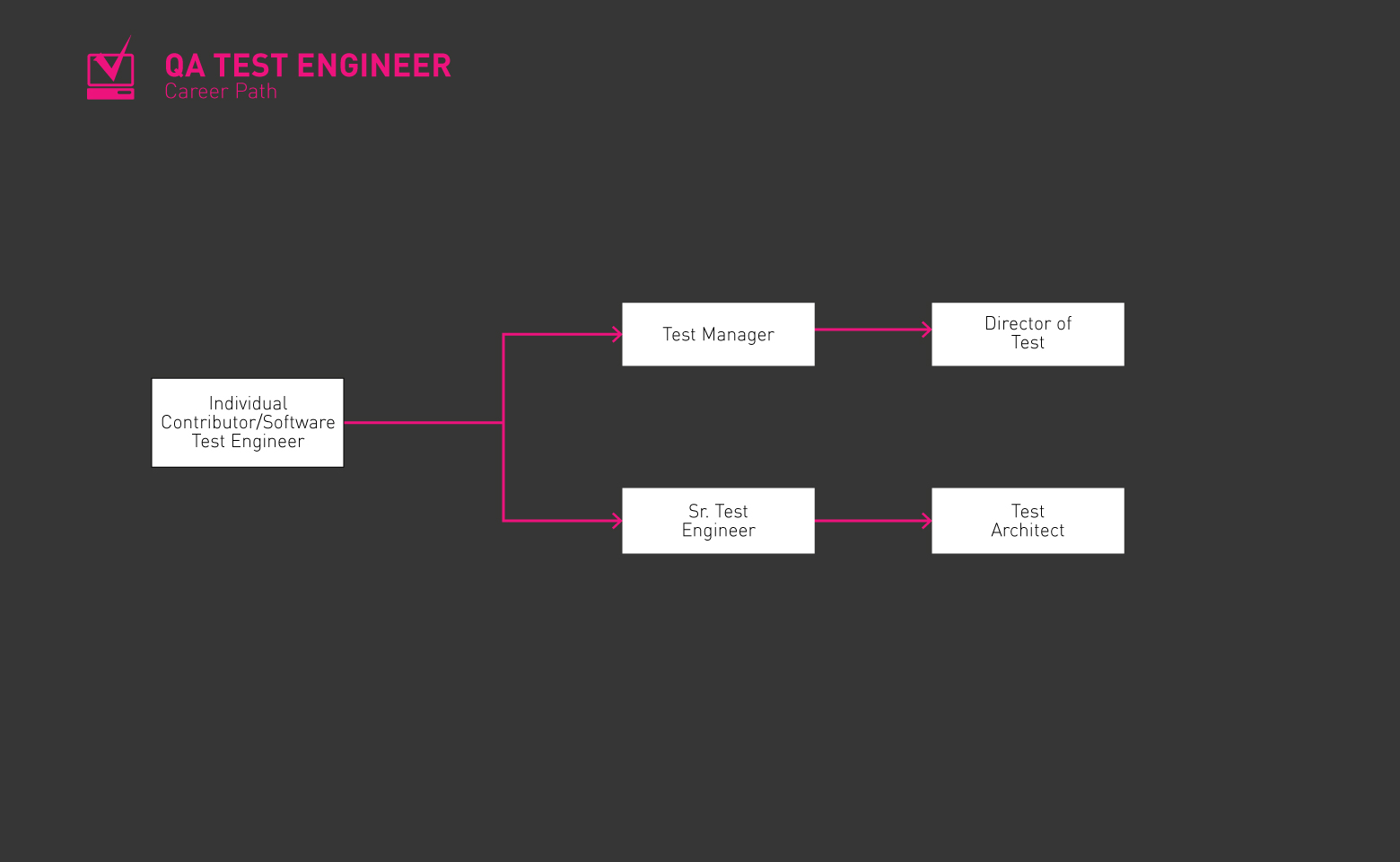Spotlights
QA Engineer, QA Automation Engineer, Quality Assurance Engineer
Test engineers build test automation for products and projects. Testing is when you make sure the product is working well and performing as it should be for every function. For instance, let’s say you want to make sure the e-mail compose page of a mail program is working properly. Testing engineers would build a program that would automatically launch the action, execute the feature, shut it down and record the results of the test.
- Getting to see aspects of your work on products that people use.
- Solving problems on a daily basis.
- Mức lương tốt
- Công việc ổn định
- Defines, documents, analyzes, performs, and interprets tests for products, systems, components, or modifications.
- Identifies functional problems and suggest resolutions.
- Analyzes test cases and provide regular progress reports.
Manager- level
- Responsible for managing the evaluation, recommendation and implementation of testing procedures and strategies for products, systems, components, or modifications.
- Acts as advisor to test engineering team regarding projects, tasks, and operations and acts as a liaison to other engineering functions.
- Ensures that projects are completed on time and within budget.
- Định hướng chi tiết
- Empathy: Good understanding of the user
- Persistence
- Tư duy phân tích
- Working well with a team
- Tự thúc đẩy
- Isn’t always as “sexy” as developing the product (software developer).
- Can be repetitive.
- Long hours on occasion
- Strong job growth.
- High demand for good talent – many of the bigger companies have perks to attract and retain great talent (i.e. work from home, sabbatical).
- Mobile market is growing.
- Fixed things: when things broke, they liked figuring out how to fix them.
- Played logic games (Sudoku, word puzzles).
- Played video games.
- ~72% of Test Engineers hold a bachelor’s degree (in a major applicable to their specialization); the rest have a master’s or higher
- 35% of Test Engineers specialize in Electrical Engineering, 12% in Computer Science, 10% in Mechanical Engineering, and 7% in Electrical Engineering. 36% major in other studies, like Industrial Engineering
- In addition to a college degree, many Test Engineers complete certifications such as Certified Scrum Master or ISTQB Certified Tester Foundation Level
- Test Engineers work with teams and should develop soft skills and communication skills, including technical writing for documents they may create
- They may need to know how to review schematics, board layouts, electrical specifications, and diagnostics specifications. Knowledge of programming languages like Python or Perl can also be useful
- Project management skills are often needed, depending on the scope of work
- Employers look for a strong mix of academics and previous experience in similar roles
- Workers should be familiar with quality standards, applicable testing techniques, and Quality Management Systems
High school: Play logic games, Build programs that fix your daily problems
College
- Engineers must have a solid foundation in math, including Algebra, Geometry, Trigonometry, Calculus I, II, and III, and Differential Equations
- There are many fields Test Engineers can work in. Look for applicable internships to gain experience
- Join clubs related to the type of engineering you study
- Volunteer to work on large projects where you can hone skills related to leadership, teamwork, conflict resolution, and project management
- Engage with professional organizations to learn, network, and keep up-to-date on trends and developments
- Read advanced trade journals and online articles to prepare for challenging college subject matter
- Keep thorough documentation of projects you work on, including notes on actions taken and results achieved
- Code!
- Get experience via crowd testing platforms (for example, software testers may sign up with uTest)
- Knock out applicable certifications, if ready
- Plan ahead for the job you want by reviewing job ads to see what qualifications are listed
- Read the trade sites and blogs.
- Speak with your college professors to ask about tips on courses to take for Test Engineer jobs
- Get an internship in engineering or information technology
- 2.5% with HS Diploma
- 5.4% with Associate’s
- 50% with Bachelor's
- 28.8% with Master's
- 3.8% with Doctoral
% of employees aged 25 to 44 in the occupation whose highest level of educational attainment is for a software engineer

- Many colleges have college recruiting for technical jobs.
- Mạng lưới!
- Apply for jobs on job listings: Create profiles on several job portals such as Monster, Indeed, Glassdoor, and Zippia
- Portfolio: Describe programming work that you have done on your own or in an internship.
- The job title “Test Engineer” can apply to several fields, so be sure to read job ads carefully
- Pay close attention to the required and preferred qualification sections. Don’t bother if you don’t meet at least all minimum required items
- Visit the career web pages of companies you’d like to work for
- If you don’t have much work experience, consider applying as an intern first
- Promote yourself and build your reputation by writing and publishing articles on LinkedIn, Medium, and/or relevant industry websites
- Review Test Engineer resume templates to get ideas for your resume
- Ask teachers, supervisors, and colleagues if they’ll serve as personal references
- Prepare for interviews by reviewing Test Engineer interview questions and sample answers
- Go into interviews relaxed, well-prepared, and dressed for success
- Interview Prep: You MUST prepare. Be ready to solve problems and write code on a white board. They’ll ask you which language you want to write in and then you write in that language. Practice with friend because the act of writing on a whiteboard and explaining it to an interviewer is very different from coding. Talk through the code and the problem.
- Read tech websites, follow prominent tech people on Google +, Twitter, Facebook (subscribe).
- Talk to people outside of tech to see what is happening in other industries.
- Learn a different programming language.
- Identify a problem that you have and build something to solve your problem – “hacker style”.
- Work on your communication and management skills.
- Network!: Attend conferences to stay up to the date with new technologies and major players in the industry.
- Become certified: Certification is available through the American Software Testing Qualifications Board, Inc., which administers a test for the international board (ITQSB) to people who want to be certified as testers at the foundational (CTFL) level or advanced level (CTAL).
Các trang web
- American Association of Engineering Societies
- American Society of Test Engineers
- Hiệp hội kiểm thử phần mềm
- IEEE
- International Engineering Consortium
- Hiệp hội kỹ sư chuyên nghiệp quốc gia
- Hiệp hội kỹ sư chuyên nghiệp quốc gia
- Hiệp hội kỹ sư nữ
- Hiệp hội Kỹ sư Cơ khí Hoa Kỳ
Sách vở
- Effective Software Testing: A developer's guide, by Mauricio Aniche
- Experimental Electrical Engineering and Manual for Electrical Testing for Engineers and for Students in Engineering Laboratories, by Vladimir Karapetoff
- Mechanical Testing for the Biomechanics Engineer, by Marnie M. Saunders
- Software Testing, by Ron Patton
- Software Testing: A Craftsman’s Approach, by Paul C. Jorgensen and Byron DeVries
Alternate Careers: Information Technology Specialist, Software Developer, Business School -> Product Manager or Product Marketing, Program Manager, Quit and Start your own company.
Nguồn cấp tin tức

Công việc nổi bật

Các khóa học và công cụ trực tuyến

Kỳ vọng về mức lương hàng năm
Người lao động mới bắt đầu khoảng 97.000 đô la. Mức lương trung bình là 110.000 đô la mỗi năm. Người lao động có nhiều kinh nghiệm có thể kiếm được khoảng 135.000 đô la.
Kỳ vọng về mức lương hàng năm
Người lao động mới bắt đầu khoảng 119.000 đô la. Mức lương trung bình là 155.000 đô la mỗi năm. Người lao động có nhiều kinh nghiệm có thể kiếm được khoảng 180.000 đô la.
Kỳ vọng về mức lương hàng năm
Người lao động mới bắt đầu khoảng 108.000 đô la. Mức lương trung bình là 137.000 đô la mỗi năm. Người lao động có nhiều kinh nghiệm có thể kiếm được khoảng 183.000 đô la.
Kỳ vọng về mức lương hàng năm
Người lao động mới bắt đầu khoảng 94.000 đô la. Mức lương trung bình là 114.000 đô la mỗi năm. Người lao động có nhiều kinh nghiệm có thể kiếm được khoảng 140.000 đô la.
Kỳ vọng về mức lương hàng năm
Người lao động mới bắt đầu khoảng 94.000 đô la. Mức lương trung bình là 132.000 đô la mỗi năm. Người lao động có nhiều kinh nghiệm có thể kiếm được khoảng 148.000 đô la.






